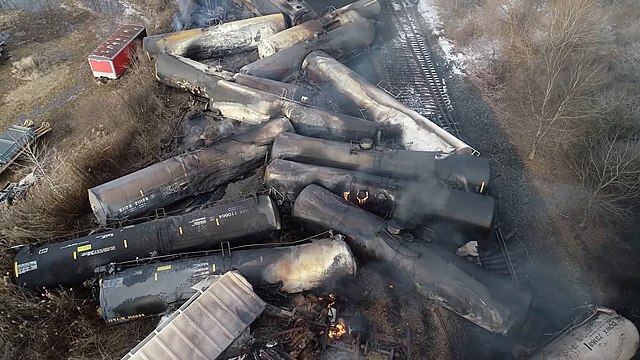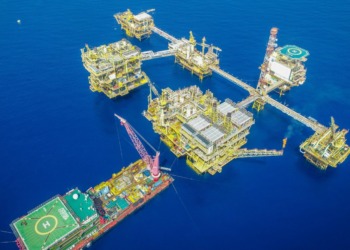On February 3, around 9:00 PM, a train of 150 cars derailed in the small village of East Palestine, 50 Miles from Pittsburgh. The Norfolk Southern train en route to Conway, Pennsylvania, from Madison, Illinois, was transporting chemicals and combustible materials, including vinyl chloride, a highly flammable carcinogen.
This is Ohio's Chernobyl. pic.twitter.com/NoPRWiWvoy
— Stew Peters (@realstewpeters) February 13, 2023
The small town of 4700 inhabitants on the border between Ohio and Pennsylvania was forced to evacuate while the environmental, health and safety hazards were investigated.
The tragedy that occurred on February 3 was rooted in an issue that appears to be plaguing Norfolk Southern: their unshakable profit-at-all-cost policy.
In 2017, Norfolk Southern Railway, a leading transportation company operating in over 20 states, successfully convinced government officials to kill a federal safety rule before it was even implemented that could’ve most likely avoided this month’s catastrophe.
The rule would’ve improved and upgraded the Civil War braking system, replacing it with an Electronically Controlled Pneumatic (ECP) one. Norfolk Southern, having installed it in one of their cars previously, praised its capacity to “reduce train stopping distances by as much as 60 percent over conventional air brake systems.”
Nonetheless, when it came down to passing a bill requiring all trains carrying hazardous, flammable materials to have this model of brakes installed, the company managed to crush the initiative.
Norfolk Southern spent over $6 million on lobby donations for the Republican Party election cycle of 2016, giving them the necessary leeway to influence the Trump administration and kill the regulation.
This also exempted many trains transporting dangerous materials, like the one in Ohio, from being classified as “high-hazard,” which would’ve ensued in various tighter safety requirements.
Steven Ditmeyer, a former senior official at the Federal Railroad Administration (FRA), told The Lever that the ECP brake would’ve definitely reduced the severity of this accident.
The Railroad Workers United (RWU), a cross-union workers’ organisation, also addressed the profit, and not safety, driven industry:
“In the last ten years, the Class One carriers [rail companies with the highest revenues] have dramatically increased both the length and tonnage of the average train, while cutting back on maintenance and inspection, and we have a time bomb ticking.”
The report also accuses Norfolk of not blocking the train properly (placing the majority of the weight on the head end and ahead of cushioned drawbars). Why? Because it takes longer, so this practice has been mostly eliminated by the rail carriers.
The primary concern for the railway company was the supposed increase in cost that the regulation would entail. They assessed that it would “impose tremendous costs without providing offsetting safety benefits.”
All that with this year’s revenue being over $12 billion?
The company spent millions on executives’ salaries and billions on stock buybacks but let go of thousands of employees, posing a clear safety risk.
Putting aside the apparent negligence of Norfolk Southern prior to the accident, let’s now delve into the openness, collaboration and good faith they have shown since the tragedy, or the flabbergasting lack thereof.
The derailment of the train led to an evacuation order of East Palestine on February 5 due to the possibility of a major explosion. The chemicals transported by the train, if exposed to the environment, could cause severe health damage, including respiratory problems, dizziness, headaches, and nausea.
In an attempt to contain the dangerous chemicals, Norfolk wanted to conduct a controlled explosion to minimise the potential environmental and health damages.
The American medias are covering up the scale of the environmental disaster in Ohio . #OhioTrainDisaster #Ohio #ohiotrain #OhioRiver #ohiotrainderailment #OhioChemicalDisaster #OhioCoverup #TrendingNow #Trending #ufotwitter pic.twitter.com/TwuaYcBb0f
— Mujeeb Rahman (@itsMujeebRahman) February 15, 2023
They also provided approximately $1,200 cash reimbursement to the families forced to evacuate the town. In addition, they donated $220,000 to replace the breathing apparatuses used by the firefighters and $25,000 to the Ohio Red Cross.
Nonetheless, their response was still heavily criticized. Four class action lawsuits were filed, requesting Norfolk Southern to pay damages, including “any current or future medical costs for exposure to toxins.” The estimated cost of two of the lawsuits already exceeds $5 million.
Related Articles: Biohacking: The Latest Health Craze, Health Hazard or Biowarfare? | Groundbreaking Lawsuit: Shell’s Board of Directors Sued for Climate Inaction | Energy Injustice: As Fossil Fuel Profits Double, Exxon Sues EU While BP Cuts Climate Targets
Governor of Pennsylvania Josh Shapiro released a strongly worded letter to the CEO of Norfolk, in which he criticised the company for the oversight prior to the accident and for their lack of communication and cooperation since.
The Pennsylvania Emergency Management Agency and Department of Environmental Protection were not immediately notified of the incident: they only discovered what had happened hours later.
To add insult to injury, Norfolk failed to work with government officials, insisting on conducting their operations independently, forcing state and local agencies to “react to tactics that were developed unilaterally.”
The company also provided “inaccurate information” about the effects of the chemicals released, making public safety and protection much more difficult.
It further failed to communicate with the state by releasing vinyl chloride from all the cars carrying it rather than the one car identified previously. They also omitted the number of cars carrying hazardous materials from their report.
“Norfolk Southern failed to explore all potential courses of action, including some that may have kept the rail line closed longer but could have resulted in a safer overall approach for first responders, residents, and the environment,” Shapiro states.
Communication issues were problematic not only between Norfolk and the local authorities but also within the community.
In an interview with CNN, Erin Brockovich, a consumer advocate and environmental activist, voiced the community’s concerns. She addressed the lack of transparency that leaves the population in a horrible and vulnerable position, not knowing whether the environment they are returning to is safe or not.
She asserts that the delay of information in addressing the people’s concerns is absolutely unacceptable from the local and federal authorities.
Her concluding point was addressed to Joe Biden’s administration: their lack of involvement was crucial to her and the community. When asked what the POTUS administration should do, her answer was clear and simple: show up.
Authority figures at all levels were under fire for their lack of involvement following the accident. Ohio Senator, JD Vance, for instance, is facing criticism online for taking ten days to acknowledge the disaster that occurred in his state.
My statement on the train crash in East Palestine. pic.twitter.com/E3IiyKOC2Z
— J.D. Vance (@JDVance1) February 13, 2023
“10 days too late and gibberish,” wrote Ned Pile in response to the tweet. Christopher Hale, a former Democratic candidate from Tennessee, pointed out that Mr Vance tweeted first about Mexican pizza days before addressing the train derailment.
The Mexican Pizza shows that America remains the most innovative country in the world. https://t.co/RHINf5awhq
— J.D. Vance (@JDVance1) February 8, 2023
Prioritising profits and donations over public safety and regulations could only have resulted in the disaster of February 3. Until politics and earnings can be put aside to focus on rebuilding a railway system dated from the Civil War, such accidents will not stop occurring.
The only question is how much more will the population have to endure before the real change takes place?
Editor’s Note: The opinions expressed here by the authors are their own, not those of Impakter.com — In the Featured Photo: Ohio Train Derailment. Featured Photo Credit: National Transportation Safety Board.










